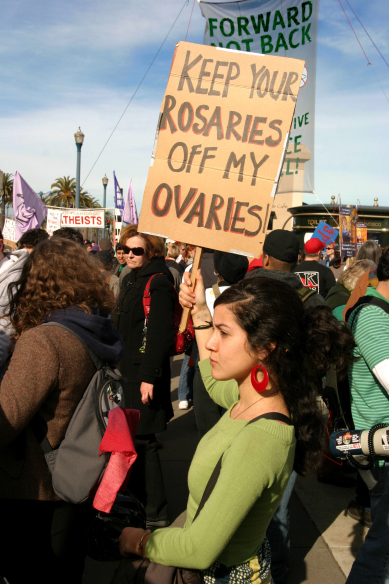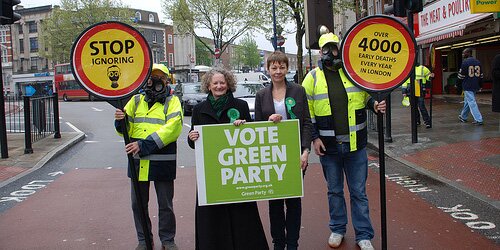Recent Feminism Articles
Pro-Choice protests after Savita Halappanavar’s death

Feminist groups are organising pro-choice protests demanding a change in Irish abortion law following the death of Savita Halappanavar who died of septecimia after being denied an abortion that could have saved her life.
Although Doctors assessed that 17-week pregnant Savita was miscarrying, they were unable to remove the foetus for three days due to the presence of a heartbeat. Abortion is legal in Ireland if the mothers’ life is at risk due ruling in 2010 from the European Court of Human Rights. However, the Irish Government has so far failed to implement any legislation to reflect the court’s ruling.
The ordeal left Savita in agonising pain, and opened her cervix up to infection. When she and her husband begged doctors to terminate the pregnancy they were told “this is a Catholic country”. Although Savita eventually had the foetus removed from her womb, it was too late and she died from infection a few days later.
The Pro-choice Campaign (Ireland) is organising a protest in Savita’s name outside the Dail at 6pm this evening, demanding that the Government cease in delaying a change to the law. The group released a statement on their facebook page accusing the Irish government of being “content to kick the problem down the road or pretend it doesn’t exist.”
“We will no longer tolerate their delaying tactics. Women’s lives are in danger until we have this legislation.”
British feminists are also planning a protest in solidarity outside the Irish Embassy in London at 6pm.
Domestic violence services in “worst crisis” on budgets

Services aimed at helping vulnerable and abused women are facing million-pound cuts as local authorities slash their budgets, leaving the womens’ sector in “the worst crisis it has ever been” in.
The top 152 councils in England are cutting spending to women’s services by an average of £44,914 each compared to budgets since 2009. Services include women’s refuges, rape crisis centres, domestic violence outreach, services for ethnic minority women, trafficked women & women in prostitution.
The cuts come in spite of a report conducted last year that found incidents of domestic violence had increased by 17% over the recession- to which experts attribute the rise. Women’s Aid report that around 320 women are turned away from domestic violence refuges each day.
Vivienne Hayes, chief executive of the Women’s Resource Centre remarked that due to the impact of the cuts, the women’s sector was in “the worst crisis it has ever been,”
“So many service providers have been forced to shut down, are not able to provide the services to fit the demand, or are having to turn women away.”
Chief executive of domestic violence charity Nia, Karen Ingala Smith said that vulnerable women may be left with “nowhere to go” once the cuts impact, and there was concern that this could lead to the deaths of some women at the hands of violent partners. It is estimated that up to two women a week are killed by their partner in Britain.
The 101 councils who responded to questions on spending through a Freedom Of Information request from the Huffington Post revealed that £5.6m of cuts have been made to services for vulnerable women when compared to 2009/10 spending. London alone has cut 1.9m.
Mary Mason of Solace Women’s Aid warned that cuts to domestic violence services could also increase the cost of the crime- £5bn in England alone. “Early intervention and support works- for every £1 spent we save £8 to statutory services.”
“Yet all our services are full, all have waiting lists and all services are forced to restrict time spent on supporting women and children.”
Liberal Conspiracy spoke to Glenda*, who was referred to her local rape crisis centre after being brutally attacked in October 2010. She received one on one counselling, which she regards as “an important part of my recovery.”
“It was good just to have somewhere safe to go where I could be with someone who understood. [They] helped me carry on surviving.”
Domestic Violence services have also warned that the true extent to the cuts may run much deeper- changes to housing benefits and reforms to universal benefit mean that some women may be unable to leave abusive and violent partners.
Barnet Council’s Labour group deputy leader Barry Rawlings explained that Refuges may have to close due to benefit reforms. “Refuges are vital for the safety of women and children and rely on housing benefit to make them viable. The concern is the payment will be direct to the claimant who may well have moved on from the refuge by the time the payments come through and the refuge will never get the payment.”
Vivienne Hayes added that “This failure to address the causes and consequences of women’s inequality and ignorance of the lifesaving and the cost saving services the women’s sector provides, is indicative of this governments’ attitude towards women.”
*name changed to protect identity
Nadine Dorries Granted Debate On Abortion Limit

Conservative MP Nadine Dorries has been granted a 90 minute debate on reducing the abortion limit from 24 to 20 weeks.
The news comes on the same day that feminist activists marched on Parliament calling for women’s needs and concerns to be more central to government policymaking- including more parliamentary support for abortion rights. Thirteen out of the current sixteen conservative members of cabinet voted for a reduction in the upper limit when the issue was last debated in Parliament in 2008.
Health Minister Jeremy Hunt caused outrage earlier this month when he voiced support for halving the abortion limit to twelve weeks. Equalities Minister Maria Miller, Theresa May and David Cameron have all said that they would support a small reduction to the limit- although Cameron insisted at the time that there were no plans for a change in legislation.
Figures released earlier this week by the Department of Health have shown a consistent year-on-year reduction in the number of abortions taking place after thirteen weeks. In 2011 16,755 abortions were performed after 13 weeks- down from 18,990 in 2008. Labour MP Diane Abbott, who supports the current 24 week limit, said “It’s becoming clear that Jeremy Hunt’s wild attack on British women’s right to choose was not based on the figures, the medical evidence, or on any real understanding of women’s lives,”
“Unfortunately, what Jeremy Hunt has done is unlock the door to the right-wing of the Tory party to begin a campaign in parliament to reduce the time limits, and also offer a supporting hand to anti-choice campaigners who protest, shout, and host vigils outside clinics, as women enter.”
Clare Murphy, Director of External Affairs at the British Pregnancy Advisory Service, argued if Dorries were “pro-woman” she ought to focus on access to contraception, improving access to early abortion and protesting cuts to midwives.
“There is no need to revisit this issue: but the tragedy is that the energy spent discussing it detracts time and attention from genuine problems in women’s reproductive healthcare.”
The debate will take place on the 31st October.
Opening Of First Abortion Clinic Sparks Protest In Northern Ireland

The first clinic offering abortion in Ireland opened it’s doors in Belfast today amidst protests from Catholics and Protestants.
The Marie Stopes family planning centre will offer the abortion pill to women under nine weeks pregnant-if doctors determine that they’re at risk of death or long term health damage from their pregnancy, in accordance with legislation in Northern Ireland. The centre will also provide contraception, emergency contraception, HIV & STI testing and ultrasounds.
More than 300 people opposed to abortion under all circumstances took the opportunity to protest outside the clinic hours ahead of it’s opening on Thursday morning, with placards reading “Keep Ireland Abortion Free”. They demanded that the centre be shut down to prevent it from becoming a beachhead for expanding abortion rights in Northern Ireland.
The leader of anti-abortion group ‘Precious Life’, Bernadette Smyth, said “We’re in 2012. Women’s health is not in danger. Women are not dying because they can’t get abortions.”
Liam Gibson from the Society of the Protection of Unborn Children called on Belfast police to arrest the clinic’s staff if they provide women with information about abortion services in Britain. Approximately 5,000 women travel to Britain from Ireland and Northern Ireland each year.
23 year old Suzanne Lee, a student from Northern Ireland, illegally ordered the abortion pill over the internet last year. She said that she would have liked to have been able to visit a Marie Stopes clinic for medical support when she self-administered the medication at six weeks of pregnancy. She described taking the pill as “quite an ordeal to go through.” It involved “severe cramping, a lot of bleeding. I bled for four weeks after it.” Lee expressed disgust that people “believe I should spend life in prison for what I did.”
Officials from Marie Stopes said that they have already been deluged with calls from women, including Republic of Ireland residents, seeking appointments. However, due to the legal restrictions in Northern Ireland, they were expecting to provide relatively few abortions.
Vice President of Marie Stopes, Tracey McNeill said “Mostly what we’ll be doing is offering advice. Many of the people we see we won’t be able to treat, because of the legal framework,” adding that as long as patients weren’t harassed and intimidated, she had no problem with the protestors. “It’s important that people express their views in a democracy.”
The right to talk about abortion
contribution by Emma Poole
I feel like I’ve been challenged. Mehdi Hasan said that no other lefty with “pro life” thoughts would dare write about this.
We live in a male dominated society and we have men joining the discussion (which I believe they have a right to) and we have a situation where the final decision will most likely be made by be a man (which I am not keen on at all).
He was accused of being sexist because his piece seemed like a judgement that he knows better than women about the decisions that affect their lives.
Let me be clear: I am pro choice. I feel for women making that decision but I also feel that the sooner it is made the better. Excepting, of course, the extenuating circumstances that do happen: i.e. finding out late after a rape or by a perpetrator of domestic violence. This option must stay available for these kind of situations.
But it is a woman’s right to choose what happens to her body. It is her choice to become a mother. It is her choice how and when that happens.
I am a human being that feels sympathy for an unwanted unborn child but I feel sympathy for those women thinking about what’s best too.
They’re the ones who have to live with it. They’re the ones who would have to live with it if the choice was taken from them.
I have never had to make this decision. I have never felt that kind of upset at the prospect of motherhood and I hope I never do. None of the men in the discussion have or will, and neither will the current health secretary.
I will not judge that choice. I will not impose my view (by changing the law) and I will not tell them they are wrong about their lives. And neither are any of the other participants in a place to do so.
Govt scales back protections against sexual harassment

The Government will be scaling back harassment protection in the workplace in a move women’s rights groups have said could “turn back time.”
In a bid to cut ‘red-tape’, employers will no longer be obliged to take steps to protect employees from harassment from third parties-such as customers. Under current legislation, reasonable steps are expected to be taken if an employee is repeatedly harassed in the work place.
The plans come during a week dominated by discussion of sexual harassment in the workplace- Janet Street-Porter, DJ Liz Kershaw and broadcaster Sandi Toksvig have all come forward with accounts of harassment and sexual assault whilst working for the BBC.
A 2012 survey of 3,400 women found that half of women had experienced ‘gendered harassment’ in the workplace.
Speaking to Liberal Conspiracy, Preethi Sundaram, Policy and Campaigns Manager for The Fawcett Society said “At a time when women’s workplace rights are already precarious, we cannot afford any risk of regression.”
“Employment regulation and protections against discrimination have been key drivers in giving women greater access to work and an independent income over the years – to put this on the bonfire would be to turn back time.”
The Enterprise and Regulatory Reform Bill will also scrap what the Government is calling “needless beauracracy and out-of-date rules,” including a complete overhaul of the employment tribunal system.
Business Minister Jo Swinson said “clearing away barriers to help businesses grow and invest is an essential part of the Government’s plan for growth.”
“The Enterprise and Regulatory Reform Bill will help strengthen the business environment and boost confidence.”
Report: Feminists integral in tackling violence against women

The largest global study into Violence Against Women has revealed that strong feminist movements were more important for instigating change than the wealth of nations, left wing political parties or the number of women politicians.
The study, published in the latest issue of the American Political Science Review, was conducted over four decades in seventy different countries. It found that feminist movements, autonomous from political parties and the state, were able to organise around top priorities for women without having to answer to wider organisational concerns or men’s needs. Such movements were able to effectively urge governments to debate and approve global and regional agreements on violence.
Autonomous feminist groups would often be the first to articulate the problem of Violence Against Women and were found to be key catalysts for government action. They were able to command public support and the attention of the media, whereas other organisations were found to be more averse to prioritising a ‘women’s issue’.
Mala Htun, co-author of the study, said, “Social movements shape public and government agendas and create the political will to address issues. Government action, in turn, sends a signal about national priorities and the meaning of citizenship. The roots of change of progressive social policies lie in civil society”
The study is unprecedented in its scope and scale- it covers every region of the world, a myriad of world religions and varying degrees of wealth and democracy. Altogether it accounts for 85% of the world’s population. The data took five years to analyse.
Htun’s co-author, S.Laurel Weldon, warned that Violence Against Women was not isolated to individual countries or cultures. “Violence against women is a global problem. Research from North America, Europe, Africa, Latin America, the Middle East, and Asia has found astonishingly high rates of sexual assault, stalking, trafficking, violence in intimate relationships, and other violations…in Europe it is a bigger danger to women than cancer, with 45 per cent of European women experiencing some form of physical or sexual violence.”
For a limited time, the study can be accessed for free here
Would you bet against the Sun’s Page 3?
Well well, this is interesting. The bookmaker Paddy Power have offered odds on a Change.org petition reaching 100,000 signatures. It’s 4/1 in September and 7/4 in October.
It will be interesting to see if this affects the rate at which people sign the petition. If it does, then we will see a new era of campaigning. Just as now, activists spend time trying to get re-tweeted by Stephen Fry, in the future Ladbrokes and Paddy Power may become targets of the same kind of secondary lobbying.
But there is more: there is a kind of open source game theory on offer here. If everyone in the country who agreed to sign the petition, while placing a £10 bet, we would all get paid for our social activism!
At the time of writing, the petition only has 26,000 signatures. So the conservative analyst would not favour September. However, we have seen in the recent past how social media and we interconnectivity it brings can have exponential effects. Remember how Claire Squires posthumously raised almost £1 million for the Samaritans.
I don’t know much about how bookies set their odds on certain outcomes, but participating in this particular ‘market’ seems odd. Unlike a sporting event, an election, or a financial exchange, there is no other person, group or team that can adversely affect the rate at which the figure in question rises.
It’s not as if there is a counter petition, and the bookies are taking bets on a race between the two. Opponents of this campaign cannot marshal their own supporters in a comparable way. So the bet is simply about how quickly a political constituency can mobilise itself. I wonder if someone who knows more about this might comment?
I am entirely in favour of the petition, by the way.
In my opinion, page 3 demeans and objectifies women. A formal ban on this kind of publication would be anti-free expression, but social pressure on an editor to make a particular decision is entirely right and proper.
Benn sorry for dismissing Assange rape allegations
The veteran socialist Tony Benn has apologised for his comments last year down-playing the rape allegations against Julian Assange.
The comments by Benn were made at a Stop the War rally in 2011 in defence of Julian Assange.
The apology was sent to students at Goldsmiths University, who published it online with permission.
The exchange started with a letter from Goldsmiths Students Union writing him a letter asking him to retract his comments.
Dear Tony
We are writing to request you apologise for and retract the comments you made at the Stop the War ‘Defend Wikileaks’ rally in February 2011 and make clear your support for the position we hold that non consensual sex is always rape and no means no.
We don’t think that it is possible to be ‘for sexual equality’ and then describe ‘non-consensual sex’ as different from rape.
As honorary president you have a level of accountability to Goldsmiths students, and they have a responsibility to hold you to that.
The idea that rape is defined by the survivor not having consent is far from controversial. It is the definition found in most dictionaries and, more importantly, the definition that the trade union and student union movement has argued for over years of struggle.
You have been a respected figure on the left for many years. It is precisely because of that, and because people therefore take your opinion seriously, that we are making this request. We hope you recognise that for many members this position is also informed by years in the struggle against sexism.
We cannot and should not fail to challenge people who are part of the left if they voice opinions that go against the hard-won values of liberation movements.We hope you are able to retract your comments.
GSU Exec
Tony Benn responded to their letter, and asked them to pass on his statement.
He said
I wish to apologise sincerely for my previous remarks on rape at the ‘Defend Wikileaks’ meeting in February 2011. These comments do not represent my position.
As an Honorary President of Goldsmiths Student Union, I share the union’s position. Hence my position is that non-consensual sex is rape, that no means no and that all allegations of rape must be treated with the utmost sincerity.
I have been involved in support for women’s rights for all of my political life and would like to state clearly that I stand with all those committed to sexual equality.
A few weeks ago the writer Naomi Wolf also walked back some of her comments on the issue, in an online interview with Mumsnet.
Why we welcome govt exploring porn filter options
contribution by Holly Dustin
Liberal Conspiracy’s discussion of the Government’s consultation on introducing ‘porn filters’ has included a tirade against some of those who have lead the argument for new controls and a polemic about the state.
The mainstream media has sadly also framed the debate as moral majority versus libertarians, while underlining the likely futility of any technological attempt at a fix.
In an ironically prudish way there has been little reference to the nature and content of the material we’re all so concerned about.
NEWS ARTICLES ARCHIVE




















